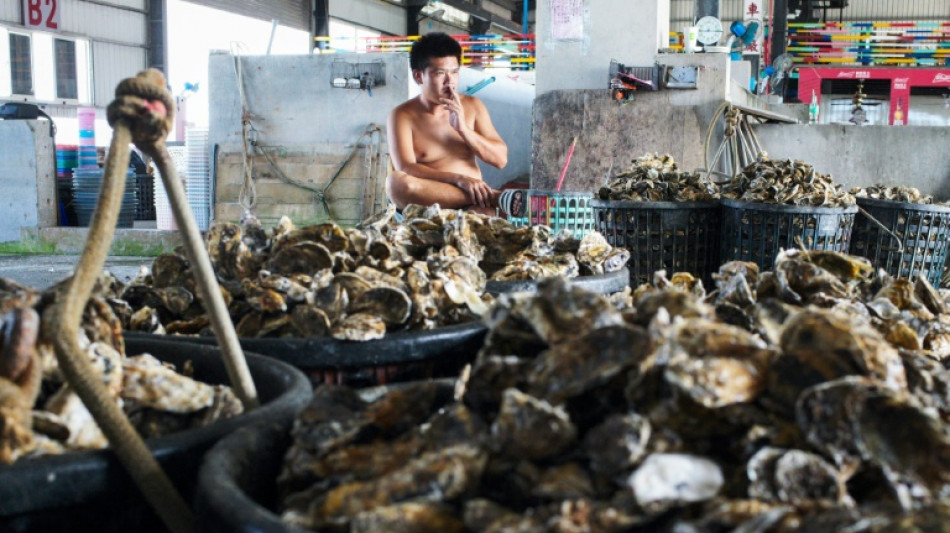
-
 Neglected killer: kala-azar disease surges in Kenya
Neglected killer: kala-azar disease surges in Kenya
-
Super Bowl set for Patriots-Seahawks showdown as politics swirl

-
 Sengun shines as Rockets rally to beat NBA champion Thunder
Sengun shines as Rockets rally to beat NBA champion Thunder
-
Matsuyama grabs PGA Phoenix Open lead with Hisatsune one back

-
 Washington Post CEO out after sweeping job cuts
Washington Post CEO out after sweeping job cuts
-
Haiti's transitional council hands power to PM

-
 N. Korea to hold party congress in February, first since 2021
N. Korea to hold party congress in February, first since 2021
-
Thailand votes after three leaders in two years

-
 Swiss joy as Von Allmen wins first gold of Winter Olympics
Swiss joy as Von Allmen wins first gold of Winter Olympics
-
George backs England to 'kick on' after Six Nations rout of Wales

-
 Malinin upstaged as Japan keep pressure on USA in skating team event
Malinin upstaged as Japan keep pressure on USA in skating team event
-
Japan's Kimura soars to Olympic gold in snowboard big air final

-
 Vail's golden comets Vonn and Shiffrin inspire those who follow
Vail's golden comets Vonn and Shiffrin inspire those who follow
-
Veteran French politician loses culture post over Epstein links

-
 Japan's Kimura wins Olympic snowboard big air gold
Japan's Kimura wins Olympic snowboard big air gold
-
Arteta backs confident Gyokeres to hit 'highest level'

-
 Hojlund the hero as Napoli snatch late win at Genoa
Hojlund the hero as Napoli snatch late win at Genoa
-
England's Arundell 'frustrated' despite hat-trick in Wales romp

-
 Lollobrigida skates to first Italian gold of Winter Olympics on her birthday
Lollobrigida skates to first Italian gold of Winter Olympics on her birthday
-
Arundell hat-trick inspires England thrashing of Wales in Six Nations opener

-
 Chile's climate summit chief to lead plastic pollution treaty talks
Chile's climate summit chief to lead plastic pollution treaty talks
-
Rosenior hails 'unstoppable' Palmer after treble tames Wolves

-
 French ex-minister offers resignation from Paris cultural hub over Epstein links
French ex-minister offers resignation from Paris cultural hub over Epstein links
-
New NBA dunk contest champ assured and shooting stars return

-
 Shiffrin says will use lessons learnt from Beijing flop at 2026 Games
Shiffrin says will use lessons learnt from Beijing flop at 2026 Games
-
Takaichi tipped for big win as Japan votes

-
 Lens return top of Ligue 1 with win over Rennes
Lens return top of Ligue 1 with win over Rennes
-
Shiffrin learning from Beijing lessons ahead of Milan-Cortina bow

-
 Demonstrators in Berlin call for fall of Iran's Islamic republic
Demonstrators in Berlin call for fall of Iran's Islamic republic
-
'Free the mountains!": clashes at Milan protest over Winter Olympics

-
 Townsend accepts pressure will mount on him after Italy defeat
Townsend accepts pressure will mount on him after Italy defeat
-
BMW iX3 new style and design

-
 Suryakumar's 84 leads India to opening win over USA in T20 World Cup
Suryakumar's 84 leads India to opening win over USA in T20 World Cup
-
Lollobrigida skates to first Italian gold of Milan-Cortina Games

-
 Barca beat Mallorca to extend Liga lead
Barca beat Mallorca to extend Liga lead
-
Gyokeres lifts Arsenal nine clear as Man Utd pile pressure on Frank

-
 Late Guirassy winner for Dortmund trims Bayern's lead atop Bundesliga
Late Guirassy winner for Dortmund trims Bayern's lead atop Bundesliga
-
'Free the mountains!": protest in Milan over Winter Olympics

-
 Gyokeres double helps Arsenal stretch Premier League lead
Gyokeres double helps Arsenal stretch Premier League lead
-
New Skoda Epiq: modern with range

-
 Six Nations misery for Townsend as Italy beat sorry Scotland
Six Nations misery for Townsend as Italy beat sorry Scotland
-
Spain, Portugal face fresh storms, torrential rain

-
 Opinions of Zuckerberg hang over social media addiction trial jury selection
Opinions of Zuckerberg hang over social media addiction trial jury selection
-
Over 2,200 IS detainees transferred to Iraq from Syria: Iraqi official

-
 Norway's Ruud tops Olympic men's freeski slopestyle qualifying
Norway's Ruud tops Olympic men's freeski slopestyle qualifying
-
Czech qualifier Bejlek claims first title in Abu Dhabi

-
 French duo reach Shanghai, completing year-and-a-half walk
French duo reach Shanghai, completing year-and-a-half walk
-
Australian snowboarder James eyes elusive Olympic gold

-
 Sequins and snow: Eva Adamczykova makes Olympic return
Sequins and snow: Eva Adamczykova makes Olympic return
-
Vonn set for Olympic medal bid after successful downhill training


Waste into gold: Oyster shells repurposed as magic 'Seawool'
Growing up on Taiwan's west coast where mollusc farming is popular, Eddie Wang saw discarded oyster shells transformed from waste to function -- a memory that inspired him to create a unique and environmentally friendly fabric called "Seawool".
Wang remembered that residents of his seaside hometown of Yunlin used discarded oyster shells that littered the streets during the harvest as insulation for their homes.
"They burned the shells and painted the residue on the walls. The houses then became warm in the winter and cool in the summer," the 42-year-old told AFP at his factory in Tainan.
"So I was curious about why oyster shells have such a miraculous effect."
Wang's Creative Tech Textile company, established in 2010, was already producing an "eco-fabric" -- a polyester material made out of recycled plastic bottles -- but he felt its texture was a bit "ordinary".
So he started working with a research institute to experiment making fabric out of the oyster shell residue, in 2013 coming up with the right formula that produces a material similar to wool.
Today, his factory in Taiwan uses around 100 tonnes of oyster shells a year to churn out around900 tonnes of Seawool,a trademarked and patented fabric.
The fabric and clothing generate around NT$200 million (US$6.1 million) a year, with the bulk of it sourced by outdoor and sustainability clothing brands in Europe and the United States.
The Made-in-Taiwan fabric would not be possible without the island's unique oyster farming culture, Wang said.
- 'A magical yarn' -
"This industry chain cannot be found anywhere else overseas," he says.
"We have people to harvest oysters, we have specialists to clean oyster shells, and we have people for drying and calcining (treating) oyster shells."
The small island of Taiwan has a hefty appetite for oysters, harvesting an estimated 200,000 tonnes a year with the fleshy meat appearing in local cuisine such as crispy omelettes and silk-like noodle dishes.
But its popularity also means that about 160,000 tonnes of shells are discarded yearly, according to data from the agricultural ministry.
They pile up on the streets of aqua-farming towns -- the majority in western cities such as Yunlin, Changhua and Chiayi -- causing environmental issues by emitting fishy smells and providing breeding sites for mosquitos.
At Wang's factory, the shells are ground into nano beads and combined with yarn made from recycled plastic bottles.
"It creates a magical yarn," he said. "Oyster shell is a material with low thermal conductivity -- it does not absorb heat nor does it dissipate heat."
Turning the shells -- which capture and store carbon dioxide from the atmosphere -- into Seawool also does not require water, making it a "low-carbon product," said Wang.
A half-hour drive from his showroom where activewear jackets, sweaters and pants are displayed, state enterprise Taiwan Sugar Corporation (TSC) also has a factory that grinds discarded shells into a powder that is used in manufacturing household items, like incense sticks.
The crushed shells help to reduce smoke and the toxic chemicals emitted from burning incense, said Chen Wei-jen, deputy chief of TSC's biotech business division.
- From waste to gold -
"We hope oyster shells can have multiple industrial applications and interested companies can use it as a raw material to make their products more environmentally friendly and add value to their products," Chen said.
Before the shells get to the factories, farmers in Chiayi -- a county famed for producing oysters -- collect the molluscs at dawn from racks installed along the coast.
They are sorted into baskets before being sent to plants such as Dai Sen-tai's factory, where they are machine-washed before being sent to small family-run businesses that shuck the meat and send the shells south.
Dai, whose family have been in the oyster farming industry for three generations, said he is happy that Taiwan is breathing new life into the sea waste.
"When I was a child, no one wanted oyster shells -- they were dumped and discarded everywhere," he told AFP.
"It's good that the waste has been turned into gold now."
D.Qudsi--SF-PST




